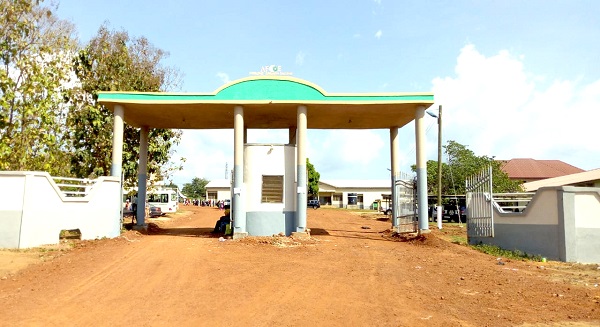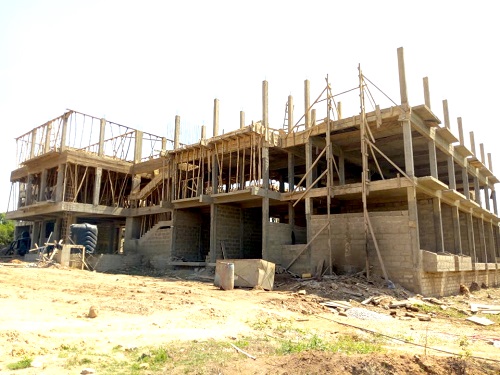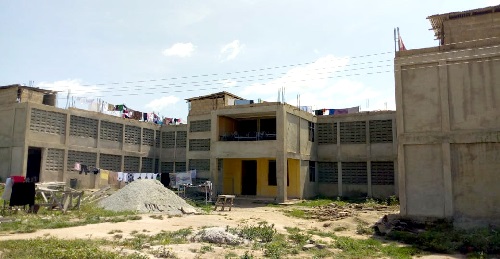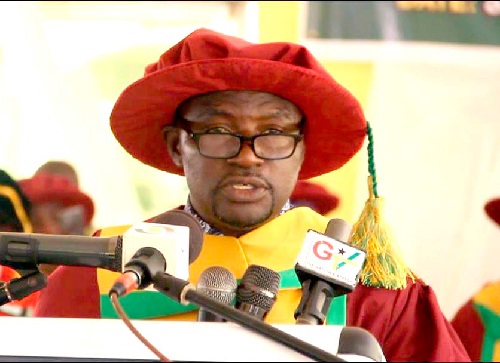
Al-Faruq reels from infrastructure lack - Only public Arabic college of education in sub-Saharan Africa appeals for support
The Al-Faruq College of Education (AFCoE) is the only public College of Education offering an approved curriculum in Arabic Education in Ghana and Sub-Saharan Africa.
Advertisement
The college is a mixed-stream Islamic Mission Institution located at Wenchi in the Bono Region.
Affiliated to the University of Cape Coast (UCC), the college runs three Bachelor of Education (B.Ed) programmes.
They are BEd in Early-Grade Education, BEd in Primary Education and BEd in Junior High School Education, with options in English and Arabic, Religious and Moral Education and Social Studies and Mathematics, Science and Information Communication Technology, among others.

History
The college was established in 1991 as the Wenchi Educational Complex (WEDCO), a private basic school by Al-Muntada Al-Islami, a Saudi Arabian non-governmental organisation (NGO), to provide secular and Islamic education to the poor, particularly the Zango communities.
In 2011, WEDCO was converted to a private College of Education and its name was changed to Al-Faruq Islamic and later to AFCoE, after it was absorbed by the government as a public college of education in June 2015.
AFCoE started operations with 205 students in September 2016 and currently has a population of 1,177.
Challenges
Despite being the only college implementing the Arabic curriculum in Sub-Saharan Africa, the infrastructure situation is dire because it inherited facilities designed and constructed as a basic school.
As a result, most of the facilities do not measure up to the tertiary institution standard. Some of the facilities are either inadequate or non-existent.
There are only two small-sized bungalows for two members of staff with the rest, including the principal commuting from town daily.
Some existing facilities had to be partitioned to make room for key offices and classrooms.
The college's mosque has also been turned into a multi-purpose facility, where people enter with their footwear, although under strict Islamic rule, it is not supposed to be so.
Currently, the mosque is being used as an examination hall, dining hall, lecture and assembly hall.

Stalled projects
A tour of the campus by the Daily Graphic revealed that there are seven abandoned projects scattered across the campus.
They include a two-storey administration block, four-storey lecture halls and a laboratory, a four-storey hostel block a cafeteria and a multi-purpose hall with a 2,000-capacity auditorium.
Others are external works with lanes, lawns, a sports field and access roads, a principal's bungalow, which is at the roofing stage and a demonstration basic school.
Additionally, the college has not had a bus since its commencement in 2016.
It was, however, heartwarming when a contractor was seen busily working on the 300-capacity hostel project funded by the Ghana Education Trust Fund (GETFund) at the time of the visit.
Appeal
At the maiden congregation last Saturday, which was on the theme: “Teacher Education and National Development: Focus on Arabic Education”, the Principal of the college, Wahab Sualihu, bemoaned the lack of development in the college and said the situation was affecting the quality training of teachers.
He, therefore, appealed to the government to motivate the contractors to come back to the site to continue work on the projects.
Mr Sualihu said the college received large volumes of applications each year, but only admitted a few students due to inadequate facilities.
“In the last academic year, for instance, the college admitted only 200 students out of 1,000 first-choice applicants,” he said.
Mr Sualihu called on the government to support the college with a bus to ease transportation pressure on students and staff to improve academic work and research.
However, he commended the government for releasing resources through the GETFund to continue the construction of the 300-capacity hostel project.
Mr Sualihu said the government awarded seven massive projects after the absorption of the college so it met the standard of a training college, but added, “It is, however, regrettable to note that all the projects have stalled.”

Greener pastures
He expressed concern about the exodus of some members of the academic staff, especially those who had attained terminal PhD degrees, to seek greener pastures in universities both within and outside the country.
“I have already lost three members of staff in the recent Ghanaian exodus to the UK and USA. I hear others are on their marks, getting set and ready to go,” Mr Sualihu said.
He said the college performed creditably in the recent fidelity of implementation of the BEd degree programme conducted by the Ghana Tertiary Education Commission (GTEC), placing 18th out of the 46 public Colleges of Education in the country.
New subjects
In a speech read for him, the acting Director-General of the GTEC, Prof. Ahmed Abdulai Jinapor, said the National Council for Curriculum and Assessment (NaCCA) had developed 37 subject curricula for senior high schools/technical schools (SHTSs) and science, technology, engineering and mathematics (STEM) subjects for implementation in the next academic year.
He expressed the need for Arabic to be part of the subjects under consideration.
He said Arabic was being considered a unit under the Languages Department for the Colleges of Education, explaining that the consideration was given because of AFCoE, which was the only college offering Arabic Education.
Prof. Jinapor said the government was implementing interventions to ensure that there were changes in Ghana's secondary education, to properly correspond with the new curriculum.
He said the government was highly committed to advancing teacher education in the country and had initiated some interventions to help it grow.
Prof. Jinapor expressed the need for teachers to be well-versed in diverse cultural and historical aspects associated with Arabic Education.
"This holistic approach ensures that students don't only learn the language but also appreciate its cultural context, fostering a deeper connection with their heritage,” he said.
Prof. Jinapor emphasised the need for teachers to be trained to instil critical thinking, creativity and a love for learning in their students.
Resolve challenges
He said as the college discussed teacher education in the context of Arabic language instruction, it must also find ways of resolving the challenges facing the field.
Prof. Jinapor called on policymakers to allocate adequate resources, update curricula to align with contemporary needs and implement measures to attract and retain skilled Arabic language teachers.
He urged the graduates to use the knowledge they had acquired to assist their communities to identify, analyse and find solutions to their local problems and be role models for their younger colleagues.
Commitment
For her part, the Bono Regional Minister, Justina Owusu-Banahene, pledged the government's commitment to roll out policies to improve teacher education across the country to ensure quality education.
Ms Owusu-Banahene encouraged the graduands to accept postings to remote communities and give off their best in such communities.
She said the refusal of graduates to accept posting to rural communities was a worrying issue, which needed to be resolved.
The maiden congregation was organised to confer degrees and diplomas on three cohorts of students who had successfully completed the prescribed programmes of study under the mentorship of UCC.
These include the first two cohorts of the phased-out three-year Diploma in Basic Education (DBE) programmes completed in 2019 and 2020 respectively and the pioneer batch of the new BEd programme degree, which was completed in 2022.
In all, 526 students of the three cohorts made up of 272 males and 254 females graduated.




